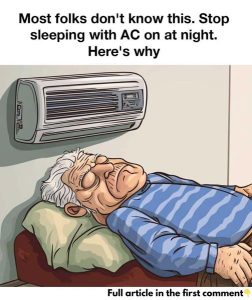In many homes, especially during the hot summer months, air conditioning (AC) is essential for a comfortable night’s sleep. However, while the cool breeze from the AC can bring immediate relief, there are potential long-term health, environmental, and financial consequences of using AC every night. This article explores why you may want to reconsider your nighttime cooling habits.

1. Health Concerns
Sleeping with the AC on can lead to several health issues, some of which you might not immediately connect to your cooling habits.
a. Dry Skin and Dehydration
AC reduces the humidity in a room, which can dry out your skin, throat, and eyes. If you wake up with a dry throat or itchy skin, the cold air may be to blame. Prolonged exposure can even lead to dehydration or respiratory problems.
b. Respiratory Problems
The cold, dry air from AC units can cause congestion and make it harder to breathe, especially for those with asthma or respiratory conditions. This can result in nighttime coughing and discomfort.
c. Increased Risk of Infections
If your AC isn’t regularly cleaned, it can become a breeding ground for mold and bacteria, which get circulated in the air. Breathing in these particles during sleep can increase the risk of infections.
d. Muscle Stiffness
Waking up with sore muscles? Cold air causes muscles to contract, which can lead to stiffness or worsen existing conditions like arthritis.
2. Disrupted Sleep Patterns
Our bodies are designed to experience slight temperature changes during sleep, but an AC set at a low temperature can interfere with this natural process.
a. Reduced Deep Sleep
Cooler rooms can prevent the body from entering deeper stages of sleep, which are essential for muscle repair and overall recovery. This lack of deep sleep can leave you feeling groggy the next day.
b. Frequent Waking
If the room gets too cold, you might find yourself waking up throughout the night. This constant waking can result in poor sleep quality, leaving you tired in the morning.
3. Environmental Impact
Using AC all night doesn’t just affect your health—it also has a significant environmental impact.
a. High Energy Consumption
Running an AC unit all night consumes a lot of electricity, placing a strain on power grids, especially during summer. This increased usage contributes to energy waste and higher utility bills.
b. Greenhouse Gas Emissions
Increased energy use leads to more fossil fuels being burned, contributing to greenhouse gas emissions. AC units also use refrigerants, which can harm the environment if not properly managed.
4. Financial Costs
Running your AC every night can quickly add up. High energy usage leads to expensive electricity bills, especially during the hottest months. Cutting down on AC use at night can result in significant annual savings.
5. Alternatives to AC for a Cool Night’s Sleep
Instead of relying solely on AC, consider these alternatives to stay cool:
a. Use Fans
Ceiling or oscillating fans use less energy and can keep air circulating without significantly lowering the room temperature.
b. Cool Bedding
Opt for breathable, moisture-wicking sheets made from cotton or linen. These materials help regulate body temperature and keep you cooler.
c. Proper Ventilation
Open windows during cooler parts of the day or night to allow fresh air to circulate.
d. Stay Hydrated
Drink plenty of water throughout the day. Proper hydration helps your body naturally regulate its temperature.
e. Take a Cool Shower
A cool shower before bed can lower your body temperature and help you feel more comfortable as you fall asleep.
f. Adjust Your AC Usage
If you need to use AC, try setting it to a higher temperature, around 78°F (25.5°C), and use a timer to turn it off after a few hours.
6. Smarter AC Use for Better Sleep
If you aren’t ready to give up your AC, here are a few tips to use it more wisely:
a. Use a Programmable Thermostat
A programmable thermostat can cool your room before bed and then raise the temperature as you sleep, helping save energy while keeping you comfortable.
b. Regular Maintenance
Keep your AC unit clean and well-maintained to prevent mold and bacteria buildup, ensuring you’re breathing clean air.
c. Combine Cooling Methods
Use a fan, cool bedding, and ventilation alongside your AC to reduce its usage and save energy.
While sleeping with the AC on provides immediate comfort, it’s important to be mindful of the potential health, environmental, and financial costs. By exploring alternative cooling methods and using your AC more efficiently, you can ensure a better night’s sleep without compromising your well-being or the planet.





